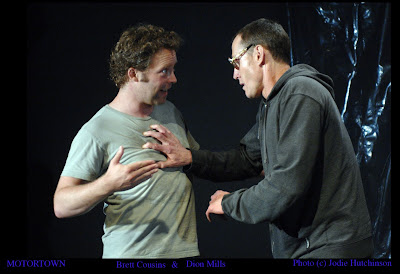Ushering in some more canards
I don't believe it. Robin Usher is at it again - there he is today in the Age's opinion pages (interestingly, not the arts pages), urging the government to set guidelines for the Melbourne Festival to stop dangerous art from erupting here at festival time.
"Is (the festival)," thunders Usher, "supposed to be an exploration of cutting-edge contemporary works or a more rounded presentation of the best acts available from around the world and locally?" I'm not sure why these two things are mutually incompatible, but there we are. Anyway, which is enough to send a shiver down any aesthete's spine, Usher predictably regards new artistic director Brett Sheehy as a "safe and sure pair of hands". Though I ought to add that it's not fair to judge Sheehy through Usher's glasses.
In a startlingly mean-minded attack on the present artistic director Kristy Edmunds, Usher goes on to work the familiar canards - that the 2005 and 2006 festivals were no good (TN and many others thought 2005 was the most exciting for years), that Edmunds is underqualified and knows nothing about classical music, that the festival "ignores an affluent segment of Melbourne's culture lovers". He even - scandalously - hints that Edmunds is only interested in contemporary dance because her partner is dancer Ros Warby. And he carefully doesn't mention that MIAF 2007 was both a critical and sell-out success.
The problem with Usher's criticisms is that they have never borne much connection to things like actual programming, or even facts. Where he claims that Edmunds changed course in her tenure, I see a singular evolving vision. Where he claims that the festival was "elitist", I saw enthusiastic audiences across a very various demographic. During Edmunds' first festival, which nobody was said to attend, I was astounded by how many queues I hand to stand in to get into theatres.
As for those "fringey" acts; well, the fact that Usher hasn't heard of an artist doesn't mean that he or she isn't internationally famous. This is the senior arts reporter who didn't know that the Avignon Festival is the biggest theatre festival in Europe, and had to ask how to spell "Avignon".
He brings up John Truscott again as part of the festival's "tradition". The thing is, I agree with Usher that Truscott was a great festival director. It's just that I think Edmunds is in the same tradition. Like Edmunds, he strongly supported local artists and brought in the most exciting "cutting edge" work (I see Usher is at least avoiding the word "fringe") from around the world.
And Truscott - for all the holiness of his memory, now he's safely in the past - was beaten around the ears for it by the grinches, just as Edmunds is being beaten now.
Usher's solution to the dangerous art problem is that the State Government introduce "guidelines" to stop the festival being at the "whim" of every blow-in director. Aside from the absurdity of the suggestion - what does he mean? Thou Shalt Program Carmen Every Festival Or Else? - it's unbelievable that any arts commentator should be seriously calling for state-sanctioned art. Yes, there's a tradition here too - ever heard of Stalin?
UPDATE: Ming-Zhu swings in with the observation that it's all so old and stinky and that her peers complain that MIAF is too full of Grand Masters. "What do you hope to achieve?" asks the redoutable Ming. "Melbourne as a silent pocket of doddering biddies dwelling eternally somewhere in the late nineteenth-century? One of the biggest problems with that idea, Mister Usher, is that I reckon that there are whole, affluent packs of doddering old biddies out there already who quite frankly can't get enough of Jan Fabre, Romeo Castellucci, Jerôme Bel, Forced Entertainment, The Sound Art Limo, or Sankai Juku..."








